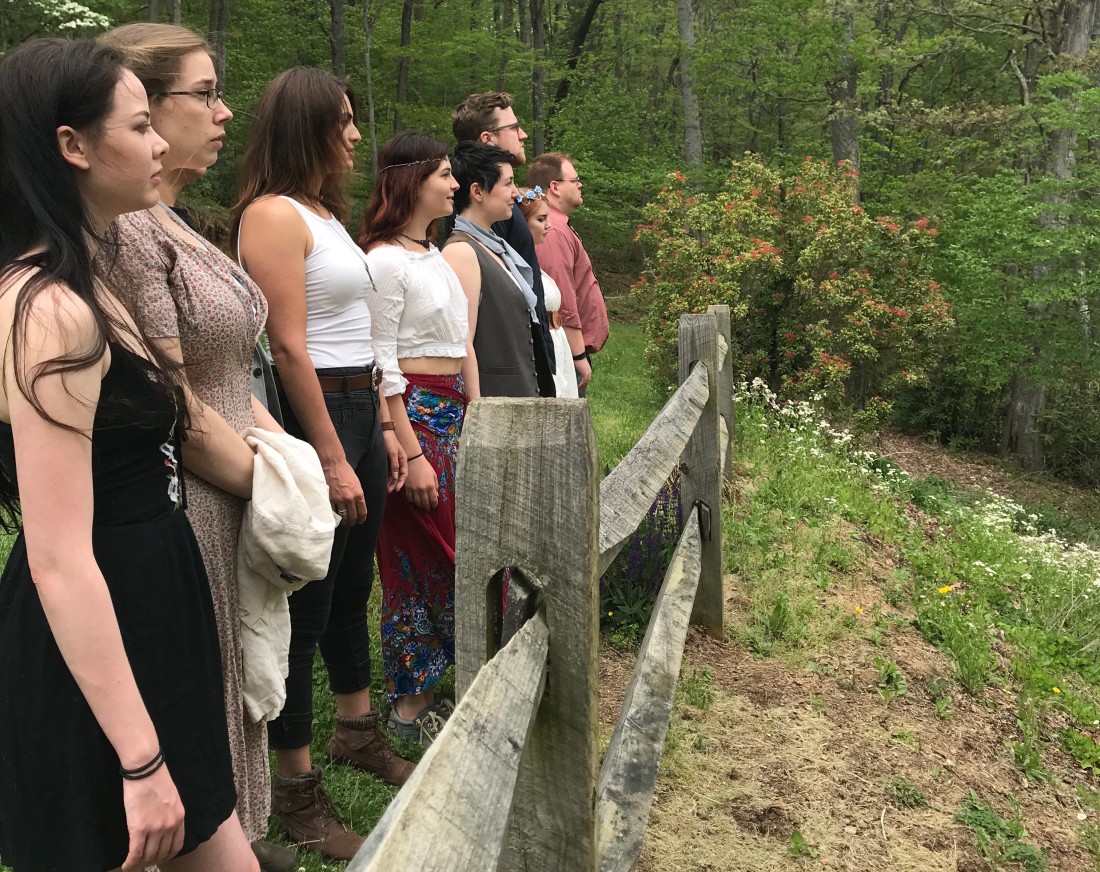When Aaron Snook was assigned Romeo and Juliet in graduate school, “Out of all the Shakespeare canon … my initial reaction was, ‘I really wish it was something else,’” he says. “I couldn’t relate to the young lovers. The height of tragedy didn’t seem earned.”
But when he shifted his attention to the community surrounding the title characters, he found “tribalism, inherited hate [and] a tinderbox ready to be set off.” So Snook began to search for a time in American history with a similar feel and discovered plenty of parallels in the Reconstruction era — specifically, the legendary Appalachian feud between the Hatfield and McCoy families.
Snook and his new-to-Asheville production company, The American Myth Center, present The Ballad of R & J, a revamped version of Romeo and Juliet, as part of the city of Asheville’s 68 Haywood Pop Up Program, opening Saturday, June 2. The show will also be performed in Grovemont Park at the Swannanoa Library on Sunday, June 17.
After 13 years spent in storefront and black-box theaters, Snook’s relocation to Asheville forced him to shift his perspective. “I realized there are [limited] indoor spaces for shows, [but] there’s a bounty of outdoor space,” he points out. So instead of seeking a brick-and-mortar location, Snook collaborated with Alex Smith, who has a fabrication company in Old Fort. Smith took a theater designer’s renderings of a mobile, boxcar-style stage and turned it into a reality.
The stage was funded through a combination of a GoFundMe campaign, private donations and grants from the Asheville Area Arts Council and the Awesome Foundation. It can be towed to a performance location (such as a park or other community space), giving The American Myth Center the ability to perform anywhere. “That could be installations, that could be a short tour,” says Snook. “Hopefully, the future propels us into other spaces. … Really, the sky’s the limit.”
The Ballad of R & J performances at 68 Haywood St. are intended not only to entertain but to address other barriers to access. Snook wants to explore “rewriting the invitation to and definition of theater,” he says, “because I think a lot of people don’t feel like that’s part of their life or don’t feel invited to it or don’t know the rules to it. … Everything from how to find your seat to how to act in your seat.”
But one of theater’s great strengths is to bring the community together, and to achieve that, Snook endeavors to “present it nontraditionally.” Or, perhaps, supertraditionally. Snook believes that Shakespeare’s plays tend to be repetitive because audiences in the Bard’s day treated performances as social gatherings. People talked. They came and went. At 68 Haywood St., passers-by drop in and leave as they please (entry is free), and Snook hopes that street noise and other unexpected elements will become part of the show.
“We know the material so well that a pub cycle shouting at us won’t bother us but could enhance the live moment,” he says. And the audience already knows the storyline of Romeo and Juliet, too, so laser-focus isn’t required.
“People can have their cellphones out and take a selfie,” says Snook. “I want to create an environment that feels like a busking-corner-turned-block party.”
Adding to that vibe will be live music both before and during the show. “I wanted to weave a ballad throughout the piece as a way for the characters to explain themselves,” says Snook. Musician Elizabeth Bagby composed an original ballad and arranged traditional pieces, such as “Satan, Your Kingdom Must Come Down,” which is performed during Juliet’s funeral.
“Roots music might be the better term for the inspiration for those pieces,” says Snook. His mother is from Swannanoa, and he spent summers in the area while growing up, so he’s uniquely positioned to point out that one difference between the Chicago cast who workshopped the play earlier and the current Asheville cast is that the local group has “an inherent understanding of the music. They get there immediately.”
The local lineup also includes two female leads, though not to forward a political agenda. The audition list was women-heavy, so “I told myself to cast the actors, regardless of gender, who are best for the roles,” says Snook.
In another nontraditional twist, the play will be performed in Appalachian dialect. It suits the Hatfield and McCoy theme, but — despite those characters being three centuries and an ocean removed — “Shakespeare wrote his poetry for these sounds,” says Snook. “The Appalachian dialect and the Elizabethan dialect have more in common than they don’t.”
He adds, “When you start hitting the Rs and elongating the vowels … it unlocks the poetry in a way you haven’t heard it before.”
WHAT: The American Myth Center presents The Ballad of R & J
WHERE: 68 Haywood St.
WHEN: Saturday, June 2-Saturday, June 30. Thursdays, Fridays and Saturdays with music at 6 p.m., show at 6:30 p.m. Free
WHERE: Grovemont Park, 101 W. Charleston Ave., Swannanoa
WHEN: Sunday, June 17, 2 p.m. All donations benefit the Swannanoa Library. americanmythcenter.org




One of the greatest plays ever written.
I dated a Baptist from Boone once.
It didn’t turn out well and she kissed like a dead fish eww. TMI?
My family didn’t care for her much being educated and all.
It was the Capulets/Montagues/Sharks/Jets/greasers/soc/Bloods/Crips type of thing for context.
Otherwise, my dating history ain’t nunyabizness.
‘ “Shakespeare wrote his poetry for these sounds,” says Snook. “The Appalachian dialect and the Elizabethan dialect have more in common than they don’t.”
This is apparently what Shakespearean speech sounded like. I’m curious if this sounds Appalachian to our ears. https://youtu.be/Hi-rejaoP7U